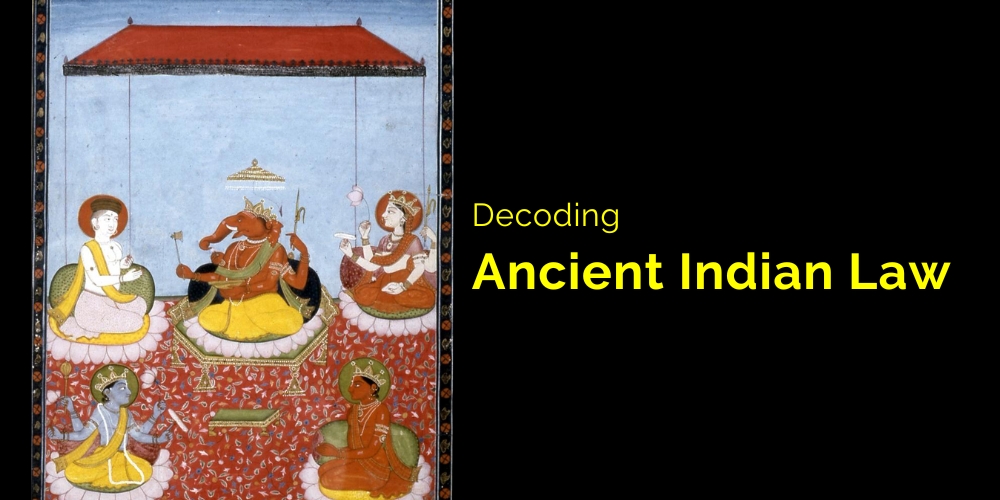
Decoding Ancient Indian Law
Explore the foundations of the ancient Indian legal system through the lens of Smriti texts in this comprehensive course. Delve into classical texts like Manusmriti and Yajnavalkyasmriti to understand the evolution of dharma, legal theories, and jurisprudence. Analyze the classifications of Vyavahāra (civil and criminal law), the role of punishment and atonement, and how these principles have shaped modern Indian law. Ideal for those interested in comparative legal studies, this course offers live interactive sessions, flexible learning options, and a certificate of completion.
Faculty
*The Course may not be offered if the number of registrations is less than 15.
2 May 2025 - 19 December 2025
7:00 PM-8:00 PM IST
Friday
Introduction
Smriti literature is a significant body of texts that outlines the guidelines and rules governing human society. Early Smritis like Manusmriti and Yajnavalkya Smriti extensively explore the concept of dharma within the framework of legal theories. These texts cover various aspects of ancient Indian jurisprudence, including the stages and classifications of Vyavahāra (legal procedure), principles of punishment, and the role of customs. The course provides a comprehensive understanding of these śāstric legal principles and their impact on the modern Indian legal system.
Course Objectives
This course aims to deepen the understanding of śāstric legal principles as discussed in the smriti texts and provide a structured approach to studying the Indian legal system. It encourages analytical thinking and the application of comparative jurisprudence to bridge ancient and modern legal theories.
Course Outcomes
- Understand the influence of the ancient Indian legal system on modern jurisprudence.
- Systematically approach smriti texts using interpretative methods to analyze the purpose of the law.
Course Syllabus
Module 1: Concept of Law in Smriti Texts
- Overview of Dharmasūtra and Smriti literature
- Dharma vis-a-vis Law
Module 2: Constituents of Legal Procedure (Vyavahāra)
- Definition and stages of Vyavahāra
- Classifications of Vyavahāra (Civil and Criminal)
- Key elements of Vyavahāra (Civil and Criminal)
Module 3: Inheritance and Customs
- Procedures of Inheritance
- Role and Objective of Customs
Module 4: Punishment and Atonement in the Legal System
- Implementation of Punishment (Daṇḍa)
- Purpose and significance of Atonement (Prāyaścitta)
Reading List
- Jha, Shasinath (2002), Yājñavalkyasmṛti. Delhi: Bharatiya Vidya Prakashan.
- Aiyangar, K.V. Rangswami (1889), Vṛhaspatismṛti. Baroda: Baroda Oriental Institute.
- Kane, P.V. (1933), Kātyāyanasmṛti. Bombay: Hindu Law Quarterly.
- Mandalik, Vishwanath Narayan (1880), Vyavahāramayukha. New Delhi: Asian Publication Services.
- Tarkalankara, M.M. Chandrakanta (2007), Parāsara Smṛti. New Delhi: Oriental Book Centre.
- Swain, Braja Kishore (1996), Nāradasmṛti. Delhi: Choukhamba Orientalia.
- Sastri, Viswanath (1992), Arthaśāstra. Varanasi: Sampurnanda Sanskrit University.
- Sastri, T. Ganapathy (1924), Arthaśāstra (Vol-2). Trivandrum: Trivandrum Sanskrit Series.
- Rustagi, Dr. Urmila (2005), Manusmṛti (Vol-I). New Delhi: J.P. Publishing House.
- Bhatta, Devan (1914), Smṛti Chandrika (Vol-III). Mysore: Government Oriental Library.
- Kane, P.V. (1930), History of Dharmaśāstra (Full volume). Pune: BORI.
- Jha, Ganganath (1933), Hindu Law in its Sources. Allahabad: The Indian Press Ltd.
- Banerji, S.C. (1998), A Companion to Dharmaśāstra. New Delhi: D.K. Printworld.
- Swain, Braja Kishore (2004), The Dharmaśāstra: An Introductory Analysis. New Delhi: Akshaya Prakasan.
- Swain, Braja Kishore (2007), The Voice of Verdict. Varanasi: Choukhamba Sanskrit Sansthan.
Course Features
- Live Interactive Sessions: Engage in live lectures with opportunities for Q&A.
- Flexible Learning: Access recorded sessions and course materials at your convenience.
- Certificate of Completion: Earn a certificate upon successfully completing the course.
*Important Enrollment Notice: Please note that this course requires a minimum of 15 registrations to commence. If the required number of students is not met, enrolled participants will be notified promptly and provided with options for a full refund or alternative courses.

